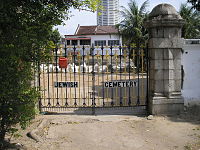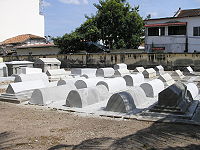
The Malayan Union was a union of the Malay states and the Straits Settlements of Penang and Malacca. It was the successor to British Malaya and was conceived to unify the Malay Peninsula under a single government to simplify administration. Following opposition by the ethnic Malays, the union was reorganised as the Federation of Malaya in 1948.

Tunku Abdul Rahman Putra Al-Haj ibni Almarhum Sultan Abdul Hamid Halim Shah was a Malaysian statesman and lawyer who served as the first prime minister of Malaysia and the head of government of its predecessor states from 1955 to 1970. He was the first chief minister of the Federation of Malaya from 1955 to 1957. He supervised the independence process that culminated on 31 August 1957. As an independent Malaysia's first prime minister, he dominated the country's politics for the next 13 years.

Abdullah bin Abdul al Kadir (1796–1854) also known as Munshi Abdullah, was a Malayan writer. The term Munshi means "teacher" or "educator". He was a famous Malacca-born munshi of Singapore and died in Jeddah, a part of the Ottoman Empire.

Tun Sir Tan Cheng Lock KBE, SMN, DPMJ, JP was a Malaysian Peranakan businessman and a key public figure who devoted his life to fighting for the rights and the social welfare of the Chinese community in Malaya. Tan was also the founder and the first president of the Malayan Chinese Association (MCA), which advocated his cause for the Malayan Chinese population.

The former communities of Jewish migrants and their descendants from Baghdad and elsewhere in the Middle East are traditionally called Baghdadi Jews or Iraqi Jews. They settled primarily in the ports and along the trade routes around the Indian Ocean and the South China Sea.
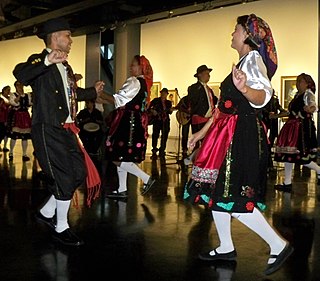
The Kristang are a creole ethnic group of people of predominantly mixed Portuguese and Malaccan descent, with substantial Dutch, British, Jewish, Malay, Chinese and Indian heritage. They are based in Malaysia and to some extent in Singapore. People of this ethnicity have, besides Portuguese, a strong Dutch heritage due to intermarriages, which is common among the Kristang. In addition, due to persecution by the Portuguese Inquisition in the region, a lot of the Jews of Malacca assimilated into the Kristang community. The creole group arose in Malacca between the 16th and 17th centuries, when the city was a port and base of the Portuguese Empire. Some descendants speak a distinctive Kristang language or Malacca Portuguese, a creole based on Portuguese. Today the government classifies them as Portuguese Eurasians.

The term "British Malaya" loosely describes a set of states on the Malay Peninsula and the island of Singapore that were brought under British hegemony or control between the late 18th and the mid-20th century. Unlike the term "British India", which excludes the Indian princely states, British Malaya is often used to refer to the Federated and the Unfederated Malay States, which were British protectorates with their own local rulers, as well as the Straits Settlements, which were under the sovereignty and direct rule of the British Crown, after a period of control by the East India Company.
This article lists important figures and events in Malayan public affairs during the year 1961, together with births and deaths of significant Malayans.
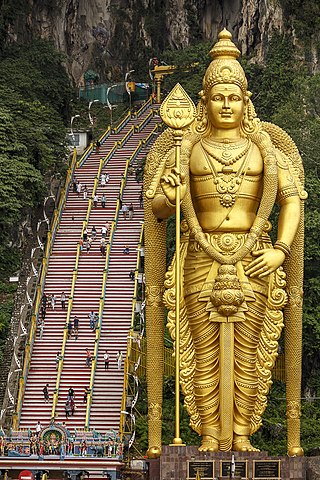
This article lists important figures and events in Malaysian public affairs during the year 2006, together with births and deaths of notable Malaysians.
This article lists important figures and events in Malayan public affairs during the year 1956, together with births and deaths of significant Malayans.
This article lists important figures and events in Malayan public affairs during the year 1955, as well as births and deaths of significant Malayans.
Tan Sri Zainal Abidin bin Ahmad or better known by the moniker Za'aba, was a Malaysian writer and linguist. He modernised the Malay language with the publication of a series of grammar books entitled Pelita Bahasa in 1936 at the Sultan Idris Training College. The book contained guidelines in modernising the structure of classical Malay, transforming it into the language that is in use today: the most significant change was the switch from the conventional passive to the modern active form of syntax.
Jews have a long history in Singapore, dating back to the 19th century, and are currently a significant minority population in the country.

The Jalan Ampang Muslim Cemetery is a cemetery at the Kuala Lumpur city centre, Malaysia. It is located at Jalan Ampang near Kuala Lumpur City Centre. The cemetery was established on 1819.
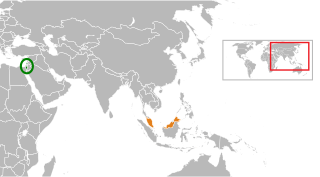
Israel–Malaysia relations refers to the commercial and cultural ties between Israel and Malaysia. The two countries currently maintain no formal diplomatic relations. Although Malaysia officially maintains an outwardly hostile position towards Israel, commercial relations between the two countries do exist, albeit very limited. Malaysian passports bear the inscription: "This passport is valid for all countries except Israel". Israeli Passport holders are forbidden to enter Malaysia without written permission from the Malaysian Ministry of Home Affairs. The recognition of Israel is a politically delicate issue for the Malaysian government.

The history of the Jews in Kolkata, formerly known as Calcutta, in India, began in the late eighteenth century when adventurous Baghdadi Jewish merchants originally from Aleppo and Baghdad chose to establish themselves permanently in the emerging capital of the British Raj. The community they founded became the hub of the Judeo-Arabic-speaking Baghdadi Jewish trading diaspora in Asia.
This article lists important figures and events in Malayan public affairs during the year 1953, together with births and deaths of significant Malayans.

Komtar is a state constituency in Penang, Malaysia, that has been represented in the Penang State Legislative Assembly since 2004. It covers George Town's city centre, including the eponymous Komtar, which houses Penang's administrative centre.
This article lists important figures and events in the public affairs of British Malaya during the year 1939, together with births and deaths of prominent Malayans.

The Minangkabau Malaysians are citizens of the Malaysia whose ancestral roots are from Minangkabau of central Sumatra. This includes people born in the Malaysia who are of Minangkabau origin as well as Minangkabau who have migrated to Malaysia. Today, Minangkabau comprise about 989,000 people in Malaysia, and Malaysian law considers most of them to be Malays. They are majority in urban areas, which has traditionally had the highest education and a strong entrepreneurial spirit. The history of the Minangkabau migration to Malay peninsula has been recorded to have lasted a very long time. When the means of transportation were still using the ships by down the rivers and crossing the strait, many Minang people migrated to various regions such as Negeri Sembilan, Malacca, Penang, Kedah, Perak, and Pahang. Some scholars noted that the arrival of the Minangkabau to the Malay Peninsula occurred in the 12th century. This ethnic group moved in to peninsula at the height of the Sultanate of Malacca, and maintains the Adat Perpatih of matrilineal kinships system in Negeri Sembilan and north Malacca.
